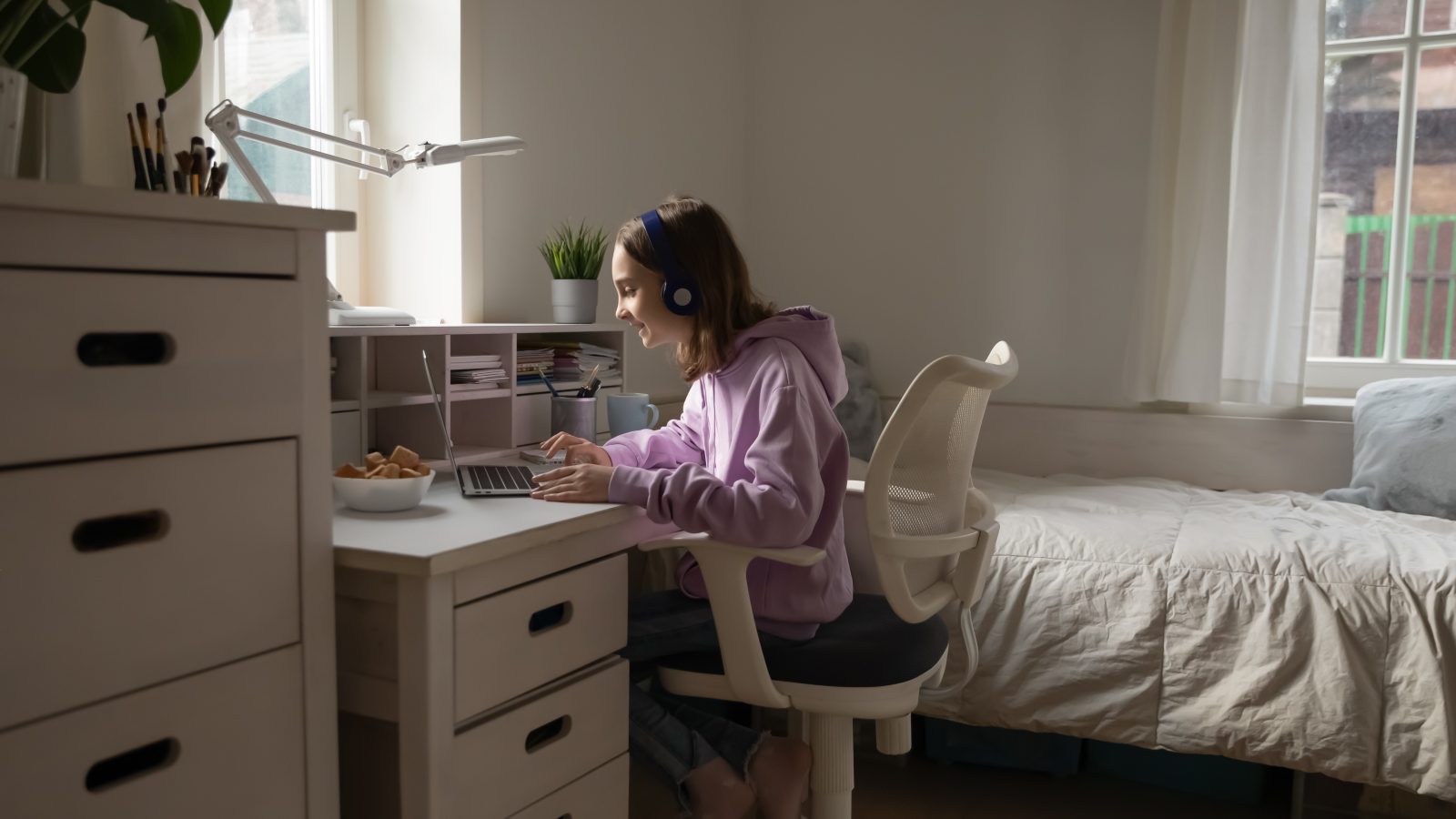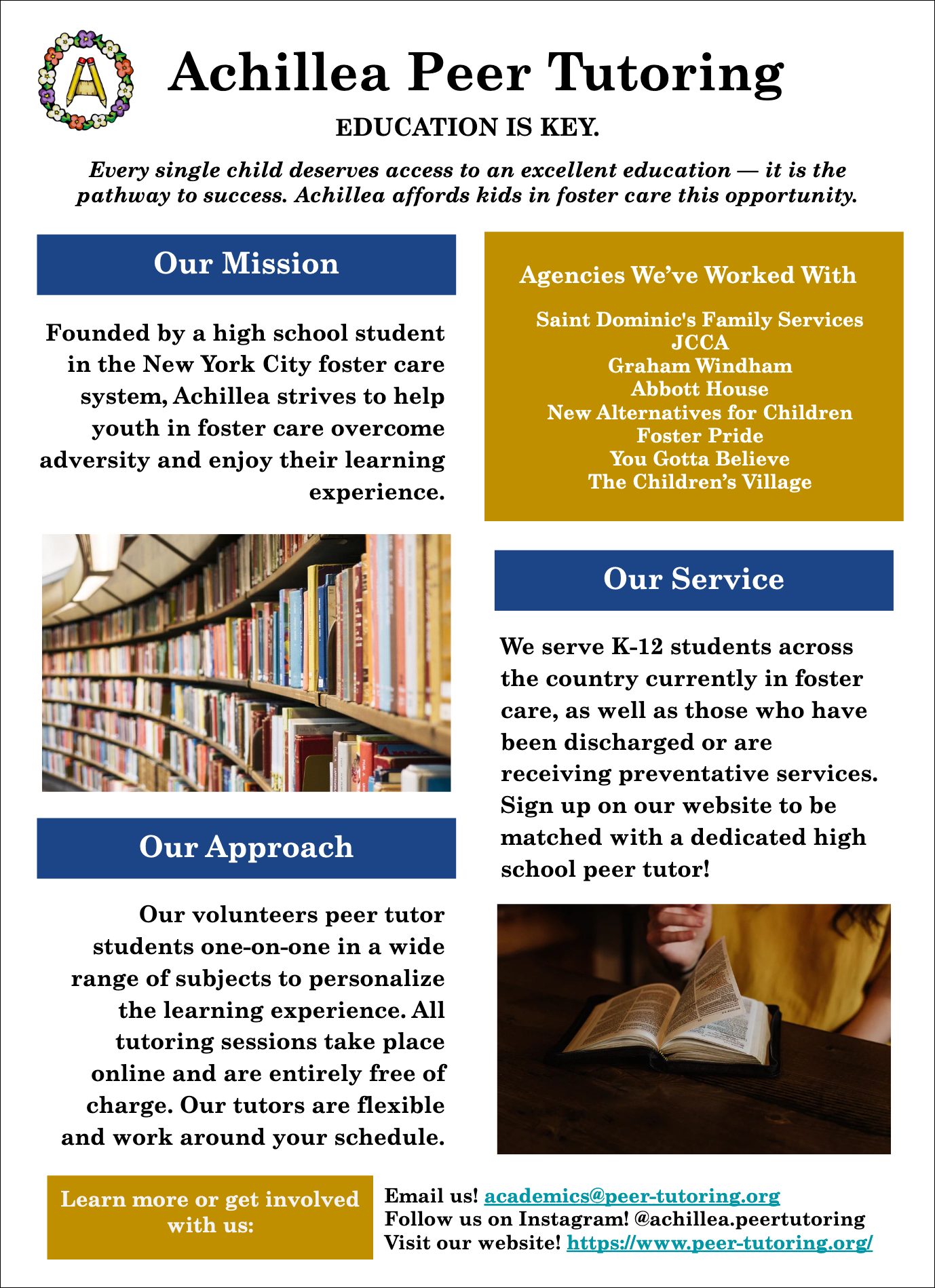
Achillea aims to give students in foster care a safe space from which to learn. Some students may have difficulty trusting an adult tutor because of negative past experiences. A bond with a peer is important during the pandemic, when foster youth can feel especially isolated.
My family has always emphasized the importance of education. All three of my aunts are teachers, and my father has helped me with my schoolwork throughout my life. My dad enrolled me in a prep course for Hunter College High School, one of New York City’s specialized schools for students in grades 7-12. When I was 12 years old, I passed the admissions test and entered Hunter.
But the following year, that progress was derailed. I went into foster care and was sent for “evaluation” to a group home — which turned out to be a lockdown facility. That meant body searches, room searches, monitored phone calls, only leaving the building with a chaperone, residents pulling the fire alarm at 3 a.m. to run away, frequent visits from the police, violence, bullying, and not being allowed to contact my friends.
Being treated like a criminal was traumatizing. Not knowing when the imprisonment would end made it worse. Workers kept telling me that there weren’t any foster homes accepting teenagers.
I couldn’t leave the facility to go to Hunter and was instead stuck for most of the time in a classroom onsite for students in grades 6-12. Usually, only six or seven kids showed up to class, which was chaotic. Nobody was learning anything.
I stayed there for five long months, missed a huge chunk of 8th grade, and had to enroll in summer school to catch up.
When I was at Hunter, I had gotten peer tutoring to help with my writing. I knew it worked, so I offered to peer tutor the other residents of the facility. Some of the residents were violent, and some bullied me, but I told myself that they didn’t know any better and were replicating bad behaviors they had been exposed to. Many foster youth do not have an adult to believe in them: I did and still do. My father continues to help me with homework and to encourage me.
I thought that if I could give the youth in the facility the care and attention they lacked, then I could help show them that they were capable of more. Succeeding academically always boosted my self-esteem. I wanted them to experience that same freeing sense of accomplishment and confidence I feel when I do well in school. Just because they lived in a lockdown facility didn’t mean that their education should suffer.
But the assistant director of the lockdown facility told me that peer tutoring would be a liability because of “safety concerns.” To me, their fear that I might get hurt while tutoring was an implicit admission that violent girls weren’t being controlled or stopped from attacking other residents.
I began thinking about how to help once I got out. I started networking with the head of Foster Pride, a nonprofit doing arts programming at the lockdown facility. She said I could help facilitate Foster Pride art workshops after I was released.
In the fall of 9th grade, I was finally placed in a foster home and was allowed to return to Hunter. Peer tutoring again helped me academically. In addition to writing, I got help with Spanish, biology, and math. I developed friendships with my tutors, which made catching up less stressful and more fun.
Still, I had trouble assimilating back into school life, and studying was difficult. The first foster home I was sent to was loud, full of distractions, and unsafe. It was hard to learn there.
I started reading up on education and foster youth. My research showed me I wasn’t alone in suffering academically from being moved around a lot: in my case, four times in the last year and a half. According to a 2014 article from The Atlantic, “Students in foster care move schools at least once or twice a year, and by the time they age out of the system, over one third will have experienced five or more school moves. Children are estimated to lose four to six months of academic progress per move, which puts most foster care children years behind their peers.”
I’ve since read more studies that confirm this struggle. Youth in care seldom get to develop effective study skills. We often don’t learn or retain key concepts that we need to build on as the subjects become more challenging. Many of us carry psychological trauma that affects our attitude toward school and our ability to focus and learn. We lose faith in ourselves, and teachers and other adults underestimate us.
Even though I was free from the lockdown facility, I kept thinking about the youth trapped in there with limited educational resources. Undaunted by the assistant director’s refusal, I created Achillea Peer Tutoring as a school club at Hunter. I named my club after the Achillea flower, which was used during the Trojan war to heal Achilles’ wounded soldiers. Although sometimes confused with a weed, the Achillea flower is capable of the extraordinary. I wanted my club to help students in foster care recognize their extraordinary capabilities and achieve all that they could.
Any high school or college student with solid grades can volunteer with us and receive community service credit for their tutoring work.
When I first approached some friends to help me form the club, I left out that I was in foster care. The lockdown facility hadn’t let me contact my friends, and most assumed something terrible had happened to me when I was gone. When people asked, I told them I’d taken summer vacation early. The only people who knew where I’d been were the administrators and teachers at Hunter, and a few close friends.
I went through so much at the lockdown facility that I developed post-traumatic stress disorder (PTSD). A good day could turn into a bad day in a matter of seconds. I didn’t know how to talk about my experience, and I worried about my friends’ reactions. I was afraid that they would either glorify my experience because it was so out of this world, or judge me as being “bad.” I wanted them to adopt the mission of tutoring foster youth for its value, not as a favor to me.
Three friends—Tiffany Zheng, York Nui, and Michelle Yu—helped with social media, IT, and communications, respectively. We launched Achillea in October 2019. Any high school or college student with solid grades can volunteer with us and receive community service credit (a graduation requirement for most high schools) for their tutoring work. We interview prospective tutors and ask for a PDF of their most recent report card.
We look for tutors who want to make a positive impact on their students beyond the sessions, and who aren’t just volunteering to get the community service credit. When applicants say things like, “I want to become a peer tutor because I understand the struggle of not understanding a concept in school, despite trying my hardest,” or “I want to be like a friend or an older sibling to the student I work with—it’s important to me that I know I’m making a real difference,” then we know they get it.
We provide our tutors with Trauma Informed Care (TIC) training, which helps them better understand what their students have been through. TIC training teaches tutors to give trauma-affected youth a sense of control and empowerment. My team contacted TIC agencies and researched the training so that we could create customized presentations for our tutors.
New Alternatives for Children (NAC), a nonprofit that supports, among others, kids in care with medical disabilities, was the first agency to take us up on our free peer tutoring offer. We sent tutors to the NAC headquarters in Manhattan to help two elementary school students with math and English. The foster kids from NAC faced challenges similar to those of the residents of my lockdown facility. Youth from both places were frustrated at not knowing the things they “should have known” but hadn’t learned. We told our tutees that we don’t judge them for the learning they missed, and instead want to help them fill in those knowledge gaps.
After that, we reached out to foster care agencies in New York City. We have gotten students from Saint Dominic’s Family Services, Graham Windham, Abbott House, Children’s Village, You Gotta Believe, Of Home, Family and Future, and JCCA.
Achillea in the Pandemic
In March, the pandemic forced us to make all tutoring remote. On the upside, we were able to expand our reach beyond New York City. Achillea now offers help in all school subjects to kids in grades K-12 across the country. We partnered with Interns4Good, which provides tutors nationwide as well.
Tutoring sessions are flexible and work around our participants’ schedules, since we create matches based on availability and grade level. Both tutors and tutees can sign up on our website. Tutees must be currently or formerly in care, or receiving preventive services.
Achillea aims to give students in foster care a safe space from which to learn. Some students may have difficulty trusting an adult tutor because of negative past experiences. A bond with a peer is important during the pandemic, when foster youth can feel especially isolated.
In a classroom, it’s easier for teachers to notice when their students are experiencing difficulties and offer extra help. In the pandemic, students are missing that attention. To make matters worse, foster youth are cut off from friends and teachers they’ve come to rely on for support. Life revolves around a device. And foster youth can be moved at any time, which happened to me during the pandemic: Suddenly, on top of everything else, I was living with strangers.
One-on-one peer tutoring can make all of this more bearable. A tutor who is your age and who knows what foster care is like can feel like a friend, and the consistent sessions help structure the day.
I know because I’m both giving that support and receiving it. Five tutors—one peer, four adults—are helping me with school. I am also peer tutoring a 16-year-old from Ukraine in English fluency, and a 15-year-old in math.
Now that more schools are going back to being completely remote, and we’re in the second wave of COVID, it is important to stay proactive and provide foster youth the academic and emotional support that they need.
I asked Aiana, a tutee I met in the lockdown facility, why she likes peer tutoring. “I don’t feel so judged when I feel like I should know something and I don’t when the tutor is a fellow student,” she replied. “The tutoring becomes more friend-like, which I think is important for growth.”
Aiana is also inspired by Achillea’s very existence. “It is amazing that this program was started by a foster kid. Achillea hasn’t only motivated me academically, but when I see teenagers like myself strive to do better, it reminds me of how much we are actually capable of.”
Receiving and providing tutoring helps me manage Achillea. I solidify my knowledge of the subjects I tutor and am always learning how different people learn. It also just feels good to give back by supporting other kids in care and improving the same system that helped me.
Achillea’s services are available to all K-12 students who are in foster care, have been discharged from foster care, or are currently receiving preventative services. To sign up, visit their website.
This essay originally appeared in Represent, the only national publication by and for youth in foster care. It was reprinted with permission from Youth Communication.
Sarah Malik is a sophomore at Hunter College High School and the founder of Achillea Peer Tutoring, providing free tutoring for current and former foster youth. She loves animals, crocheting, and creative writing. Sarah is currently working her way through all flavors of potato chips known to man.



